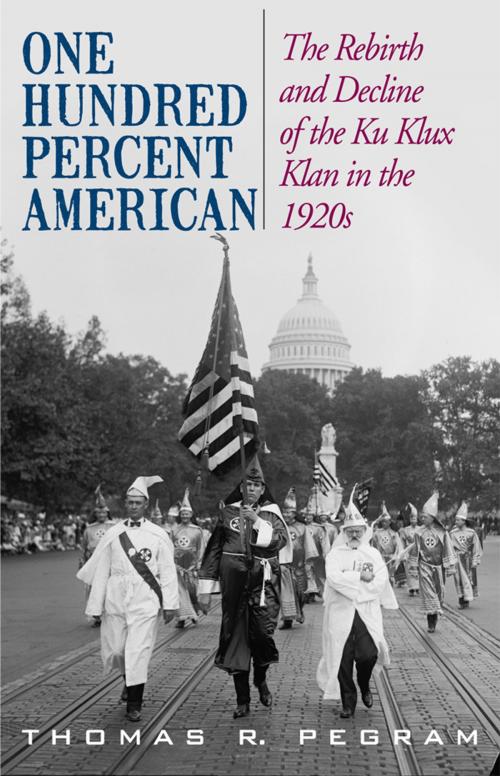One Hundred Percent American
The Rebirth and Decline of the Ku Klux Klan in the 1920s
Nonfiction, Social & Cultural Studies, Social Science, Discrimination & Race Relations, History, Americas, United States, 20th Century| Author: | Thomas R. Pegram | ISBN: | 9781566639224 |
| Publisher: | Ivan R. Dee | Publication: | October 16, 2011 |
| Imprint: | Ivan R. Dee | Language: | English |
| Author: | Thomas R. Pegram |
| ISBN: | 9781566639224 |
| Publisher: | Ivan R. Dee |
| Publication: | October 16, 2011 |
| Imprint: | Ivan R. Dee |
| Language: | English |
In the 1920s, a revived Ku Klux Klan burst into prominence as a self-styled defender of American values, a magnet for white Protestant community formation, and a would-be force in state and national politics. But the hooded bubble burst at mid-decade, and the social movement that had attracted several million members and additional millions of sympathizers collapsed into insignificance. Since the 1990s, intensive community-based historical studies have reinterpreted the 1920s Klan. Rather than the violent, racist extremists of popular lore and current observation, 1920s Klansmen appear in these works as more mainstream figures. Sharing a restrictive American identity with most native-born white Protestants after World War I, hooded knights pursued fraternal fellowship, community activism, local reforms, and paid close attention to public education, law enforcement (especially Prohibition), and moral/sexual orthodoxy.
No recent general history of the 1920s Klan movement reflects these new perspectives on the Klan. One Hundred Percent American incorporates them while also highlighting the racial and religious intolerance, violent outbursts, and political ambition that aroused widespread opposition to the Invisible Empire. Balanced and comprehensive, One Hundred Percent American explains the Klan's appeal, its limitations, and the reasons for its rapid decline in a society confronting the reality of cultural and religious pluralism.
In the 1920s, a revived Ku Klux Klan burst into prominence as a self-styled defender of American values, a magnet for white Protestant community formation, and a would-be force in state and national politics. But the hooded bubble burst at mid-decade, and the social movement that had attracted several million members and additional millions of sympathizers collapsed into insignificance. Since the 1990s, intensive community-based historical studies have reinterpreted the 1920s Klan. Rather than the violent, racist extremists of popular lore and current observation, 1920s Klansmen appear in these works as more mainstream figures. Sharing a restrictive American identity with most native-born white Protestants after World War I, hooded knights pursued fraternal fellowship, community activism, local reforms, and paid close attention to public education, law enforcement (especially Prohibition), and moral/sexual orthodoxy.
No recent general history of the 1920s Klan movement reflects these new perspectives on the Klan. One Hundred Percent American incorporates them while also highlighting the racial and religious intolerance, violent outbursts, and political ambition that aroused widespread opposition to the Invisible Empire. Balanced and comprehensive, One Hundred Percent American explains the Klan's appeal, its limitations, and the reasons for its rapid decline in a society confronting the reality of cultural and religious pluralism.















